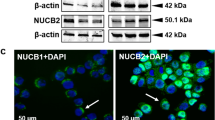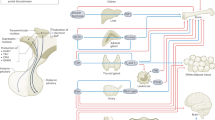Abstract
It is well established that ACTH and β-lipotropin (LPH) originate from a common precursor molecule1–3. Recently the complete complementary DNA sequence of the bovine precursor was reported4, and within the cryptic sequence of this molecule is a third melanocyte stimulating hormone (MSH) region tentatively named γ-MSH4. The signal peptide of this molecule consists of 26 amino acids in both the rat5 and mouse6. Pulse-chase experiments using both rat and mouse pituitary cells, showed the gradual maturation of this common precursor to proceed via the initial cleavage of the carboxy terminal β-LPH, followed by release of ACTH, leaving an NH2-terminal extension of about 105 amino acids, which does not seem to undergo appreciably further maturation1–3,7. It is within the sequence of this NH2-terminal extension that γ-MSH is located4. It is not yet clear what the biological role of this molecule is and whether γ-MSH itself is released. Recently, it was shown that a synthetic 12 amino acid bovine γ-MSH fragment possessed very little melanophore-stimulating activity as compared to α-MSH8. We report here the successful purification of the human NH2 terminal cryptic peptide, its amino acid composition and present some of its tryptic fragments. The data show that human and bovine γ-MSH have identical amino acid composition.
This is a preview of subscription content, access via your institution
Access options
Subscribe to this journal
Receive 51 print issues and online access
$199.00 per year
only $3.90 per issue
Buy this article
- Purchase on Springer Link
- Instant access to full article PDF
Prices may be subject to local taxes which are calculated during checkout
Similar content being viewed by others
References
Roberts, J. L. & Herbert, E. Proc. natn. Acad. Sci. U.S.A. 74, 5300–5304 (1977).
Mains, R. E., Eipper, B. A. & Ling, N. Proc. natn. Acad. Sci. U.S.A. 74, 3014–3018 (1977).
Crine, P. et al. Proc. natn. Acad. Sci. U.S.A. 75, 4719–4723 (1978).
Nakanishi, S. et al. Nature 278, 423–427 (1979).
Gossard, F., Seidah, N. G., Crine, P., Routhier, R. & Chrétien, M. Biochem. biophys. Res. Commun. 92, 1042–1051 (1980).
Keutmann, H. T., Eipper, B. A. & Mains, R. E. J. biol. Chem. 254, 9204–9208 (1979).
Gianoulakis, C., Seidah, N. G., Routhier, R. & Chrétien, M. J. biol. Chem. 23, 11903–11906 (1979).
Ling, N., Ying, S., Minick, S. & Guillemin, R. Life Sci. 25, 1773–1780 (1979).
Chrétien, M., Benjannet, S., Dragon, N., Seidah, N. G. & Lis, M. Biochem. biophys. Res. Commun. 72, 472–478 (1976).
Seidah, N. G. et al. J. Chromatogr. (in the press).
Seidah, N. G., Benjannet, S., Lis, M. & Chrétien, M. (in preparation).
Håkanson, R., Eckman, R., Sundler, F. & Nilsson, R. Nature 283, 789–792 (1979).
Author information
Authors and Affiliations
Rights and permissions
About this article
Cite this article
Benjannet, S., Seidah, N., Routhier, R. et al. A novel human pituitary peptide containing the γ-MSH sequence. Nature 285, 415–416 (1980). https://doi.org/10.1038/285415a0
Received:
Accepted:
Issue Date:
DOI: https://doi.org/10.1038/285415a0
This article is cited by
-
Pro-gamma-MSH levels in various disorders of pituitary-adrenal axis
Journal of Endocrinological Investigation (1990)
Comments
By submitting a comment you agree to abide by our Terms and Community Guidelines. If you find something abusive or that does not comply with our terms or guidelines please flag it as inappropriate.



